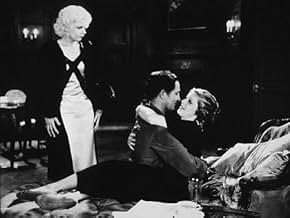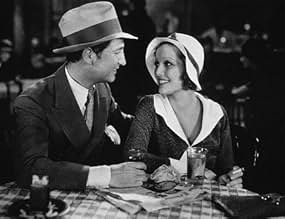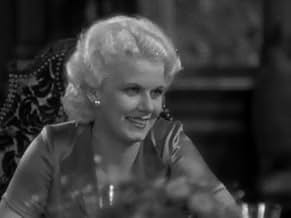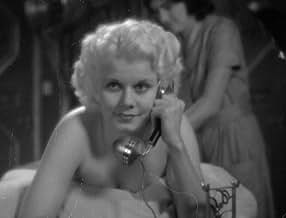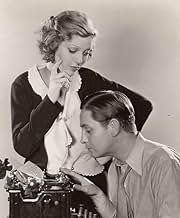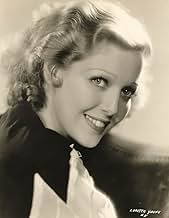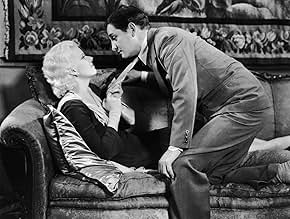IMDb-BEWERTUNG
6,7/10
3862
IHRE BEWERTUNG
Füge eine Handlung in deiner Sprache hinzuA young woman from a very rich family impulsively marries a reporter, but each assumes the other is the one whose lifestyle must change.A young woman from a very rich family impulsively marries a reporter, but each assumes the other is the one whose lifestyle must change.A young woman from a very rich family impulsively marries a reporter, but each assumes the other is the one whose lifestyle must change.
- Auszeichnungen
- 2 wins total
Don Dillaway
- Michael Schuyler
- (as Donald Dillaway)
Claud Allister
- Dawson - The Valet
- (as Claude Allister)
Wilson Benge
- Butler
- (Nicht genannt)
Vance Carroll
- Reporter
- (Nicht genannt)
Eddy Chandler
- Hank - A Reporter
- (Nicht genannt)
Richard Cramer
- Speakeasy Proprietor
- (Nicht genannt)
Oliver Eckhardt
- Reporter
- (Nicht genannt)
Bill Elliott
- Ann's Beau - The Round-the-World Flyer
- (Nicht genannt)
Adolph Faylauer
- Party Guest
- (Nicht genannt)
J.C. Fowler
- Reporter
- (Nicht genannt)
Empfohlene Bewertungen
I see that I'm in good company here on IMDb in first wondering why on earth I had never heard of Robert Williams before and then in regretting that his career was cut so short after hearing his story.
Williams proves himself to be a winning and engaging comedian in this very funny Frank Capra film about a reporter (Williams) who marries a society dame (Jean Harlow) only to realize that his true love is for the female co-worker (Loretta Young) who's been by his side the whole time. Never mind that Young is one hundred times more feminine and prettier than Harlow -- I just chalk it up to the theory that Harlow had a certain look that was very much in vogue in the 1930s and that made her extremely attractive to people.
I don't think Harlow is at all attractive, but I do see her appeal, and I didn't find her performance to be as bad in this film as the history books have claimed. It's true that the casting should have been reversed, and Young should have played the society belle with Harlow as the working-class girl next door. But never mind. She equips herself pretty well with the material given her, and she manages to be believable in the role.
But in any case, it's neither of the women you'll remember from this movie. It's Williams and his absolutely fantastic way with a funny line. He died of appendicitis at the age of 37, and it's clear that 30s movie audiences lost a potentially major star when they lost him.
Grade: A-
Williams proves himself to be a winning and engaging comedian in this very funny Frank Capra film about a reporter (Williams) who marries a society dame (Jean Harlow) only to realize that his true love is for the female co-worker (Loretta Young) who's been by his side the whole time. Never mind that Young is one hundred times more feminine and prettier than Harlow -- I just chalk it up to the theory that Harlow had a certain look that was very much in vogue in the 1930s and that made her extremely attractive to people.
I don't think Harlow is at all attractive, but I do see her appeal, and I didn't find her performance to be as bad in this film as the history books have claimed. It's true that the casting should have been reversed, and Young should have played the society belle with Harlow as the working-class girl next door. But never mind. She equips herself pretty well with the material given her, and she manages to be believable in the role.
But in any case, it's neither of the women you'll remember from this movie. It's Williams and his absolutely fantastic way with a funny line. He died of appendicitis at the age of 37, and it's clear that 30s movie audiences lost a potentially major star when they lost him.
Grade: A-
Robert Williams plays the kind of role Spencer Tracy did time and again at Fox and MGM--the brash, likeable working man--and, in fact, the picture suggests a dry run of Tracy's "Libeled Lady." There's a breach-of-promise suit, a roomful of reporters cracking wise, a rich-rich Long Island clan existing to be mocked, and the kind of farcical complications that made the newspaper comedy one of the '30s' most endearing genres. Unfortunately, the dialogue isn't as snappy as it thinks it is, and Jean Harlow is as miscast as a society dame as Loretta Young is as a world-weary reporter -- the whole thing might have made more sense if they switched roles. The compensations, though, are many: Capra giving his actors brilliant bits of business (the "puttering" scene is an unsung classic), a roster of swell character actors, and some pre-Production Code naughtiness, including two very sexy love scenes between Williams and Harlow. Capra's pace is slower than usual, and his later works had cleverer plot twists. His handling of actors, though, is as beautiful to behold as ever. And in Williams' irresistible performance, we have a glimpse of a star that might have been.
PLATINUM BLONDE marks the start of three careers- First, Frank Capra. He has a natural style of handling actors. There is scene where lovebirds Jean Harlow and Robert Williams mock sing-song to each other. It feels improvised, very natural, unlike the stage learned dialog that infested early talkies. He's experimental with camera angles, and playing with sound (One scene is filmed by a crackling fountain) and he keeps the pace and dialog delivery going at rocket pace. Then you have Jean Harlow. Wow, do you have Jean Harlow! Not only is she stunningly beautiful (even when photographed from behind) but she has a cool, likable wit (She suppose to be a society dame, but she makes the character so likable, you just want to hang around). Thirdly, you have Robert Williams, who was just starting to make a name for himself with this 1931 film. Sadly, this bristling talent died later that year of appendicitis. He's wonderfully energetic, quirky and full of speed (He's so wonderfully jumpy when he feels enclosed in a stuffy mansion you'd think he has Starbucks running through his viens.) PLATINUM BLONDE seems to be dress rehersal for the film Capra would make five years later- MR. DEEDS GOES TO TOWN (My favorite Capra film) Williams (Like Gary Cooper) is labeled "Cinderella Man", he loves yodelling and getting the servants to yodel in his newfound mansion home. Catch this film if you can.
Platinum Blonde launched so many careers - the most infamous being Frank Capra and Jean Harlow. It is not a perfect film by any stretch of the imagination. The sound is bad, Harlow is terribly miscast, and poor Loretta Young struggles valiantly to bring depth to a part that is the filmic equivalent of wallpaper. As many have said before me, she and Harlow would have done well to reverse roles.
But the greatest on screen portrayal of fresh, modern, naturalistic acting (a style that later would be attributed to James Dean) is from the wonderful, refreshingly brilliant young Robert Williams in 1931!!!!! I would never mark this film as a masterpiece, yet I would encourage all struggling male actors to study this man's work as a prime example of how to dominate a scene without any artifice or aggression. Every time he enters a room, the whole film lights up, and every time he leaves, all the other actors seem to lose their purpose and energy.
I have never seen such simple perfection, and I am saddened to no end to learn of his untimely death at thirty-four, just as he was starting to get roles worthy of his genius. I could not get enough of this man's work, and regret having so little of it to view. An absolute must see for Robert Williams alone!
But the greatest on screen portrayal of fresh, modern, naturalistic acting (a style that later would be attributed to James Dean) is from the wonderful, refreshingly brilliant young Robert Williams in 1931!!!!! I would never mark this film as a masterpiece, yet I would encourage all struggling male actors to study this man's work as a prime example of how to dominate a scene without any artifice or aggression. Every time he enters a room, the whole film lights up, and every time he leaves, all the other actors seem to lose their purpose and energy.
I have never seen such simple perfection, and I am saddened to no end to learn of his untimely death at thirty-four, just as he was starting to get roles worthy of his genius. I could not get enough of this man's work, and regret having so little of it to view. An absolute must see for Robert Williams alone!
There is a scene with Robert Williams and Jean Harlow singing a ditty to each other. There was such natural wit and affection that their infatuation and joy in each others company was perfectly expressed. This was love, this was sensuality, without a hint of the physicality that modern movies are forced to graphicly depict. Seeing a movie like this, made in low fidelity black and white seventy years ago shows what we have lost.
Wusstest du schon
- WissenswertesIn a 2008 interview, actor Christopher Plummer called Williams "...one of the most realistic comedians the screen had. He made Cary Grant look like he was overacting... To watch Robert Williams act was like seeing a comic using the Method, long before the Method became famous with Marlon [Brando] (Marlon Brando) and Monty [Clift] (Montgomery Clift)."
- PatzerWhen they are looking at the front page of "The Tribune Paper", in the headlines, the word "okay" is misspelled. It shows "It's okey with me."
The spelling of "OK" was not standardized for a long time. Writer Dashiell Hammett among others spelled it "okeh" and "oke",
- Zitate
Dexter Grayson: Where were you yesterday?
Anne Schuyler: Oh, Stew and I went for a long ride. Dexter, is there any finishing school we could send him to?
Dexter Grayson: Yes - Sing Sing!
- VerbindungenEdited into 365 days, also known as a Year (2019)
Top-Auswahl
Melde dich zum Bewerten an und greife auf die Watchlist für personalisierte Empfehlungen zu.
- How long is Platinum Blonde?Powered by Alexa
Details
Box Office
- Budget
- 600.000 £ (geschätzt)
- Laufzeit
- 1 Std. 29 Min.(89 min)
- Farbe
Zu dieser Seite beitragen
Bearbeitung vorschlagen oder fehlenden Inhalt hinzufügen

